Giant planets - Study guides, Class notes & Summaries
Looking for the best study guides, study notes and summaries about Giant planets? On this page you'll find 186 study documents about Giant planets.
Page 2 out of 186 results
Sort by
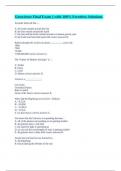
-
Geoscience Final Exam || with 100% Errorless Solutions.
- Exam (elaborations) • 18 pages • 2024
-
Available in package deal
-
- $13.29
- + learn more
Aristotle believed that .... A. the Earth rotated around the Sun B. the Sun rotated around the Earth C. the Sun and the Earth rotated around a common gravity spot D. the Earth and Sun both stand still correct answers B. Buffon thought the world was about __________ years old. 1000 7500 75,000 7,500,000,000 correct answers C. The "Father of Modern Geology" is .... A. Strabo B. Steno C. Lyell D. Hutton correct answers D. Venus is a _____________. Gas Giant Terrestri...
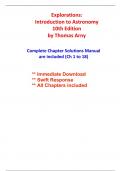
-
Solutions for Explorations: Introduction to Astronomy, 10th Edition Arny (All Chapters included)
- Exam (elaborations) • 112 pages • 2023
-
- $29.49
- + learn more
Complete Solutions Manual for Explorations: Introduction to Astronomy, 10th Edition by Thomas Arny, Stephen Schneider ; ISBN13: 9781266673375. (Full Chapters included Chapter 1 to 18). Problems included. Chapter 1: The Cycles of the Sky. Chapter 2: The Rise of Astronomy. Essay 1: Backyard Astronomy. Chapter 3: Gravity and Motion. Chapter 4: Light and Atoms. Essay 2: Special and General Relativity. Chapter 5: Telescopes. Chapter 6: Earth. Chapter 7: The Moon and Tides. Essay 3: Keeping ...
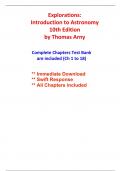
-
Test Bank for Explorations: Introduction to Astronomy, 10th Edition Arny (All Chapters included)
- Exam (elaborations) • 373 pages • 2023
-
- $29.49
- + learn more
Complete Test Bank for Explorations: Introduction to Astronomy, 10th Edition by Thomas Arny, Stephen Schneider ; ISBN13: 9781266673375. (Full Chapters included Chapter 1 to 18).... Chapter 1: The Cycles of the Sky. Chapter 2: The Rise of Astronomy. Chapter 3: Gravity and Motion. Chapter 4: Light and Atoms. Chapter 5: Telescopes. Chapter 6: Earth. Chapter 7: The Moon and Tides. Chapter 8: The Terrestrial Planets. Chapter 9: The Giant Planets. Chapter 10: Small Bodies Orbiting the Sun. ...
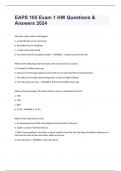
-
EAPS 105 Exam 1 HW Questions & Answers 2024
- Exam (elaborations) • 15 pages • 2024
-
Available in package deal
-
- $9.49
- + learn more
EAPS 105 Exam 1 HW Questions & Answers 2024 What lies in the center of the galaxy? a. a void, like the eye of a hurricane b. the oldest stars in the galaxy c. a supermassive black hole d. the home world of our galactic empire - ANSWER-c. a supermassive black hole Which of the following statements about the solar system are correct? a. It formed 4.6 billion years ago. b. At least one of the giant planets are formed of rock and metal like terrestrial planets. c. The orbits of the ma...
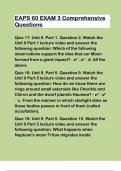
-
EAPS 60 EXAM 3 Comprehensive Questions With Correct Researched Answers|14 Pages
- Exam (elaborations) • 14 pages • 2024
- Available in package deal
-
- $8.49
- + learn more
Quiz 17: Unit 9. Part 1. Question 2. Watch the Unit 9 Part 1 lecture video and answer the following question: Which of the following observations support the idea that our Moon formed from a giant impact? - ️️d. All the above Quiz 18: Unit 9. Part 5. Question 9. Watch the Unit 9 Part 5 lecture video and answer the following question: How do we know there are rings around small asteroids like Chariklo and Chiron and the dwarf planets Haumea? - ️️c. From the manner in which starlight dims...
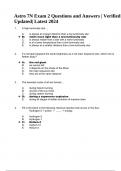
-
Astro 7N Exam 2 Questions and Answers | Verified Updated| Latest 2024.
- Exam (elaborations) • 15 pages • 2024
- Available in package deal
-
- $12.99
- + learn more
Astro 7N Exam 2 Questions and Answers | Verified Updated| Latest 2024. 1. A high-luminosity star ... A: is always at a larger distance than a low-luminosity star B: emits more light than a low-luminosity star C: is always redder than a star with a lower luminosity D: is at a lower temperature than a low-luminosity star E: is always at a smaller distance than a low-luminosity star 2. If a red giant appears the same brightness as a red main sequence star, which one is farther away? A:...
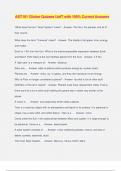
-
AST101 Clicker Quizzes UofT with 100% Correct Answers
- Exam (elaborations) • 19 pages • 2024
-
- $13.49
- + learn more
AST101 Clicker Quizzes UofT with 100% Correct Answers What does the term "Solar System" mean? - Answer- The Sun, the planets, and all of their moons What does the term "Universe" mean? - Answer- The totality of all space, time, energy, and matter Earth is 1 AU from the Sun. What is the maximumpossible separation between Earth and Mars? (Hint: Mars is the next farthest planet from the Sun) - Answer- 2.5 AU A 'light year' is a measure of: - Answer- distance Stars are... -...
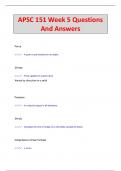
-
APSC 151 Week 5 Questions And Answers
- Exam (elaborations) • 18 pages • 2024
- Available in package deal
-
- $11.49
- + learn more
Jupiter ~ largest planet gas giant strong magnetic field counter rotating layers in the atmosphere mantle composed of metallic hydrogen Has 79 orbiting moons Saturn ~ second-largest and sixth planet from the Sun; has a complex ring system, at least 31 moons, and a thick atmosphere made mostly of hydrogen and helium No one knows how long one day on Saturn is Uranus ~ 7th planet from the sun planets ~ 1. A planet orbits the Sun directly (is not a satellite) 2. A planet is large en...
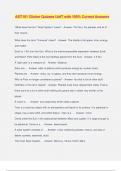
-
AST101 Clicker Quizzes UofT with 100% Correct Answers
- Exam (elaborations) • 19 pages • 2024
-
- $12.49
- + learn more
AST101 Clicker Quizzes UofT with 100% Correct Answers What does the term "Solar System" mean? - Answer- The Sun, the planets, and all of their moons What does the term "Universe" mean? - Answer- The totality of all space, time, energy, and matter Earth is 1 AU from the Sun. What is the maximumpossible separation between Earth and Mars? (Hint: Mars is the next farthest planet from the Sun) - Answer- 2.5 AU A 'light year' is a measure of: - Answer- distance Stars are... - Answer- bal...
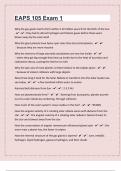
-
EAPS 105|71 Exam 1 Review Questions Well Anwered|2025
- Exam (elaborations) • 7 pages • 2024
- Available in package deal
-
- $7.99
- + learn more
Why the gas giants had to form within 3-10 million years from the birth of the Sun - ️️they had to attract hydrogen and helium gases before these were blown away by the solar wind Why the giant planets have faster spin rates than terrestrial planets - ️️because they are more massive Why the interiors of large asteroids and planets are very hot inside - ️️when they get big enough they heat up inside due to the heat of accretion and radioactive decay, causing the interior to melt Wh...

Study stress? For sellers on Stuvia, these are actually golden times. KA-CHING! Earn from your study resources too and start uploading now. Discover all about earning on Stuvia


